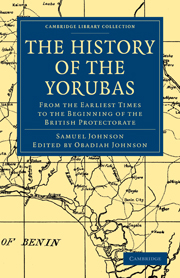Book contents
- Frontmatter
- AUTHOR'S PREFACE
- EDITOR'S PREFACE
- Contents
- 1 INTRODUCTION
- 2 THE YORUBA LANGUAGE
- 3 A SKETCH OF YORUBA GRAMMAR
- PART I THE PEOPLE, COUNTRY, AND THE LANGUAGE
- CHAPTER I ORIGIN AND EARLY HISTORY
- CHAPTER II THE ORIGIN OF THE TRIBES
- CHAPTER III RELIGION
- CHAPTER IV GOVERNMENT
- CHAPTER V YORUBA NAMES
- CHAPTER VI YORUBA TOWNS AND VILLAGES
- CHAPTER VII THE PRINCIPLES OF LAND LAW
- CHAPTER VIII MANNERS AND CUSTOMS
- PART II
- APPENDIX A TREATIES AND AGREEMENTS
- APPENDIX B
- INDEX
CHAPTER III - RELIGION
Published online by Cambridge University Press: 05 July 2011
- Frontmatter
- AUTHOR'S PREFACE
- EDITOR'S PREFACE
- Contents
- 1 INTRODUCTION
- 2 THE YORUBA LANGUAGE
- 3 A SKETCH OF YORUBA GRAMMAR
- PART I THE PEOPLE, COUNTRY, AND THE LANGUAGE
- CHAPTER I ORIGIN AND EARLY HISTORY
- CHAPTER II THE ORIGIN OF THE TRIBES
- CHAPTER III RELIGION
- CHAPTER IV GOVERNMENT
- CHAPTER V YORUBA NAMES
- CHAPTER VI YORUBA TOWNS AND VILLAGES
- CHAPTER VII THE PRINCIPLES OF LAND LAW
- CHAPTER VIII MANNERS AND CUSTOMS
- PART II
- APPENDIX A TREATIES AND AGREEMENTS
- APPENDIX B
- INDEX
Summary
The Yorubas originally were entirely pagans. Mohammedanism which many now profess was introduced only since the close of the eighteenth century. They, however, believe in the existence of an Almighty God, him they term Olorun, i.e., Lord of Heaven.
They acknowledge Him, Maker of heaven and earth, but too exalted to concern Himself directly with men and their affairs, hence they admit the existence of many gods as intermediaries, and these they term Orisas.
We may note here that the term Olorun is applied to God alone and is never used in the plural to denote Orisas. Kings and the great ones on earth may sometimes be termed Orisas (gods) by way of eulogy, we are also familiar with the common expression, “Oyinbo ekeji Orisa” i.e., white men are next to the gods (i.e in their powers); but the term Olorun is reserved for the Great God alone.
They also believe in a future state, hence the worship of the dead, and invocation of spirits as observed in the Egũgun festival, a festival in which masked individuals personate dead relatives.
They have a belief also in a future judgment as may be inferred from the following adage, “Ohungbogbo ti a se l'aiye, li a o de idena Orun ka” (Whatever we do on earth we shall give an account thereof at the portals of heaven).
- Type
- Chapter
- Information
- The History of the YorubasFrom the Earliest Times to the Beginning of the British Protectorate, pp. 26 - 39Publisher: Cambridge University PressPrint publication year: 2010First published in: 1921



